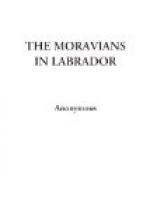In the same year, 1773, Paul Eugenus Laritz, from the Elders’ Conference of the Unity, visited the missions. He was accompanied by John Ludwig Beck, who had spent some years in Greenland with his father, and learned the language. They came in the ship Amity to Newfoundland, which they left there for the purpose of fishing, and proceeded to the coast of Labrador in a shallop or sloop with one mast, which had been purchased for the use of the mission. On the 20th of July they arrived at Nain, where the missionaries welcomed them with tears of joy—the Esquimaux received them with shouting and other rude expressions of pleasure. Of these, some hundreds, this summer, had set up their tents around the settlements—many of them strangers from a distance. In the evening they had a short discourse in the mission-house, after which the brethren visited them in their tents, and conversed further with them on what they had heard. The same evening Laritz gave a short address to the assembled baptized Esquimaux, and delivered the salutations of the European congregations to them, Drachart being his interpreter. Then one of the Esquimaux answered in name of the rest—“We, our wives and children, were wonderfully glad when we saw the little ship come in; and we thank the brethren that they have come to us, and brought us so many good words that we have never heard before. We love all the brethren, and will be ever their good friends. We will constantly visit them to hear the good word of Jesus’ sufferings. We think on the Saviour; we love him, and will give up our hearts to him, and renounce all our old heathenish customs. We agree with the Innuit who live on the east coast opposite us. We, and our wives and our children, in our houses and our tents, speak of the Saviour becoming man, of his sufferings and death. We cannot deny that we are sinners, but we think the Saviour will be gracious to us.” As there was not room in the mission-house to contain all the Esquimaux, wood was cut down to build a large meeting-hall. Some appeared deeply impressed by the word of God, particularly Manamina, his sister Alingana, and Akaplack, who were received as catechumens.
Soon after Laritz’s arrival at Nain, a sloop of war unexpectedly made its appearance, dispatched by Commodore Shuldam from Newfoundland, commanded by Lieutenant Cartes, to explore the coast, and to see if the poor people who had settled there were all still in life. The Lieutenant stopped some days with the brethren, and expressed his astonishment and happiness to find them so well accommodated, and on such good terms with the Esquimaux. He had expected to find dark, sour, starving fanatics, living in huts of earth, and his disappointment was therefore the more agreeable. Through Drachart he told the Esquimaux, that they should go no more to the English settlements in the south, nor rob and murder. They answered, We have never either robbed or murdered, since the time we heard of the Saviour. Robbers and murderers shall be punished as they deserve; and when we come to the south to get fir-timber, we will bring with us a letter from the brethren to the gentlemen of Cheteau Bay. The officer assured them of his love, and said to Drachart, that the great change in the behaviour of these people appeared to him a miracle of God, who had begun his work among them.




